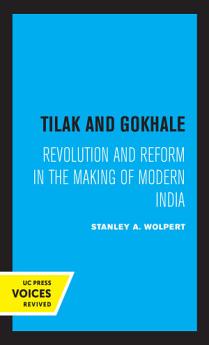Tilak and Gokhale: Revolution and Reform in the Making of Modern India
Apr 2023 · Univ of California Press
Ebook
386
Pages
family_home
Eligible
info
reportRatings and reviews aren’t verified Learn More
About this ebook
Stanley Wolpert’s study reframes India’s independence as the culmination of a long gestation rather than a sudden post-1947 birth, arguing that the intellectual and organizational groundwork for nationalism was laid well before Gandhi and Nehru. Centering on Bal Gangadhar Tilak and Gopal Krishna Gokhale—Gandhi’s most consequential predecessors—Wolpert tracks how their contrasting strategies and moral frames shaped methods of agitation, political education, and mass mobilization by the end of World War I. Tilak’s fiery populism and constitutional militancy (“Father of Indian Unrest” to detractors, national hero to admirers) drew on newspapers, street politics, and cultural revival; Gokhale’s ethical gradualism relied on legislative craft, institution building, and tutelary reform. The book contends that Gandhi’s later success synthesized Tilak’s mobilizing technique with Gokhale’s moral method, translating an inherited repertoire into a program capable of compelling British retreat without civil collapse.
Wolpert also maps the source terrain and historiography. Tilak has attracted abundant, often hagiographic biographies (notably Kelkar’s Marathi trilogy, Karandikar, Tahmankar), grounded in the rich Kesari–Mahratta archives; British assessments like Chirol’s Indian Unrest supply a hostile counterpoint. Gokhale, by contrast, is underrepresented—his moderation, closeness to British officials, and early death yielding fewer, more memoiristic accounts (Paranjpe, Sastri, Gandhi’s tribute) and a handful of fuller biographies (Shahani, Hoyland). Rather than reprise single-figure lives, Wolpert stages a comparative analysis to show how each leader’s moves refracted and provoked the other’s, how both rode—and redirected—main currents of Indian political tradition, and how their competing impulses—revolution and reform—coalesced in the making of modern India. Rejecting “great man” determinism while foregrounding agency, he reads their interaction against institutional and cultural constraints, arguing that understanding their dialogue clarifies the lineage, limits, and continuity of Indian nationalism.
This title is part of UC Press's Voices Revived program, which commemorates University of California Press’s mission to seek out and cultivate the brightest minds and give them voice, reach, and impact. Drawing on a backlist dating to 1893, Voices Revived makes high-quality, peer-reviewed scholarship accessible once again using print-on-demand technology. This title was originally published in 1961.
Wolpert also maps the source terrain and historiography. Tilak has attracted abundant, often hagiographic biographies (notably Kelkar’s Marathi trilogy, Karandikar, Tahmankar), grounded in the rich Kesari–Mahratta archives; British assessments like Chirol’s Indian Unrest supply a hostile counterpoint. Gokhale, by contrast, is underrepresented—his moderation, closeness to British officials, and early death yielding fewer, more memoiristic accounts (Paranjpe, Sastri, Gandhi’s tribute) and a handful of fuller biographies (Shahani, Hoyland). Rather than reprise single-figure lives, Wolpert stages a comparative analysis to show how each leader’s moves refracted and provoked the other’s, how both rode—and redirected—main currents of Indian political tradition, and how their competing impulses—revolution and reform—coalesced in the making of modern India. Rejecting “great man” determinism while foregrounding agency, he reads their interaction against institutional and cultural constraints, arguing that understanding their dialogue clarifies the lineage, limits, and continuity of Indian nationalism.
This title is part of UC Press's Voices Revived program, which commemorates University of California Press’s mission to seek out and cultivate the brightest minds and give them voice, reach, and impact. Drawing on a backlist dating to 1893, Voices Revived makes high-quality, peer-reviewed scholarship accessible once again using print-on-demand technology. This title was originally published in 1961.
About the author
Wolpert Stanley : Enter the Author Bio(s) here.
Rate this ebook
Tell us what you think.
Reading information
Smartphones and tablets
Install the Google Play Books app for Android and iPad/iPhone. It syncs automatically with your account and allows you to read online or offline wherever you are.
Laptops and computers
You can listen to audiobooks purchased on Google Play using your computer's web browser.
eReaders and other devices
To read on e-ink devices like Kobo eReaders, you'll need to download a file and transfer it to your device. Follow the detailed Help Center instructions to transfer the files to supported eReaders.







